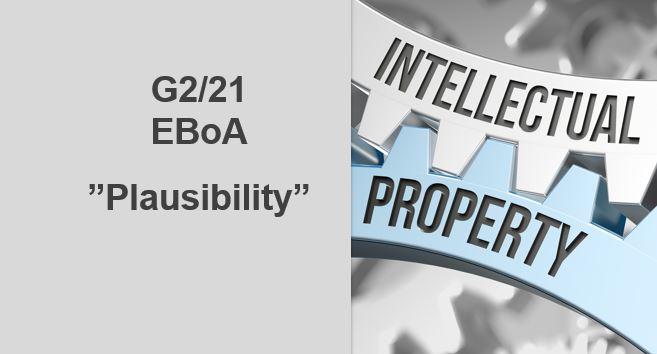Referral G2/21 to the Enlarged Board of Appeal of the European patent office

- Kathy Wasström
- –
- News
- –
- 14.12.2021

In October 2021, a new referral was made to the Enlarged Board of Appeal at the EPO, and given the code G2/21. The issue discussed in the referral was briefly named “plausibility”.
The referral was made in decision T0116/18 of the Boards of Appeal. This decision concerned an appeal filed after an opposition against a patent relating to insecticide compositions. The appeal case involved a discussion on inventive step relying on a technical effect that the proprietor had attempted to demonstrate with the help of post-published evidence.
Post-published evidence is evidence that was not public before the filing date of the patent in suit. It is also not part of the application as filed.
It was considered necessary to refer the case to the Enlarged Board of Appeal, since the allowability of the main request of the patent depended on such post-published data as proof of an effect achieved using the insecticides, and since three diverging lines of earlier case law on interpretation of such issues were identified. Thus, they considered it necessary to obtain a decision from the Enlarged Board that would unify these lines of case law. The three lines were identified as follows.
- Ab initio plausibility: According to one line of EPO case law, post-published evidence can be taken into account only if the skilled person had reason, based on the application as filed and the common general knowledge at the filing date, to assume that the technical effect described in this post-published evidence is achieved. However, in such cases, the application as filed should include some data justifying this assumption.
- Ab initio implausibility: Another line of case law indicates that post-published evidence can only be disregarded if the skilled person would have had legitimate reasons to doubt that the technical effect would have been achieved on the filing date. Such doubt can be based for example on the application as filed or the common general knowledge indicating that the alleged technical effect is not obtained.
- No plausibility: Based on a third line of case law, the lack of plausibility is not a sufficient reason for disregarding post-published evidence, since the inventive step argumentation might require re-formulation, after the date of filing, of the technical problem solved by the invention. Thus, the application as filed can not be expected to already contain all the evidence demonstrating this newly formulated technical effect.
Clearly, these different lines of case law can lead to significant differences in the outcomes of such cases.
Why is this important?
The EPO President has decided on 23.11.2021 that all examination and opposition proceedings, the outcome of which entirely depends on the outcome of this referral, will be suspended until the decision of the Enlarged Board has been given.
The following questions were referred to the Enlarged Board of Appeal for decision.
If for acknowledgement of inventive step the patent proprietor relies on a technical effect and has submitted evidence, such as experimental data, to prove such an effect, this evidence not having been public before the filing date of the patent in suit and having been filed after that date (post-published evidence):
1. Should an exception to the principle of free evaluation of evidence (see e.g. G 3/97, Reasons 5, and G 1/12, Reasons 31) be accepted in that post-published evidence must be disregarded on the ground that the proof of the effect rests exclusively on the post-published evidence?
2. If the answer is yes (the post-published evidence must be disregarded if the proof of the effect rests exclusively on this evidence), can the post-published evidence be taken into consideration if, based on the information in the patent application in suit or the common general knowledge, the skilled person at the filing date of the patent application in suit would have considered the effect plausible (ab initio plausibility)?
3. If the answer to the first question is yes (the post-published evidence must be disregarded if the proof of the effect rests exclusively on this evidence), can the post-published evidence be taken into consideration if, based on the information in the patent application in suit or the common general knowledge, the skilled person at the filing date of the patent application in suit would have seen no reason to consider the effect implausible (ab initio implausibility)?

